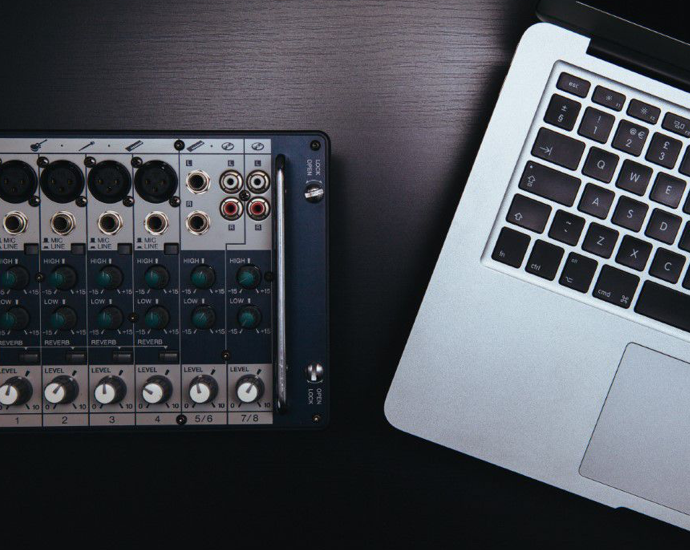This article is part 3 of ‘AI and the Creative Process in Music‘ – an article series written by Virginie Berger for music creators and their teams of today. Click here for part 1 and part 2.
The music industry is adapting to significant changes with the integration of artificial intelligence. These advancements are directly impacting business operations, from enhancing trend analysis and royalty distribution to improving personalized user experiences and effective content protection. AI’s role in the industry marks a shift towards more data-driven decision-making, opening new avenues for revenue generation and operational efficiency in music creation, distribution, and licensing.
Revolutionizing Music Prediction and Trend Analysis
The ability of AI to predict music trends represents a major breakthrough. AI algorithms already analyze vast amounts of data from streaming platforms, social media, and other digital interactions to identify potential hits. By detecting early viral growth signals, these AI systems can predict which songs or artists are likely to become popular. This marks a significant shift from traditional methods that rely more on industry intuition than on data-driven insights. Such predictive data is helpful for artists and record labels in strategizing releases and marketing campaigns, ensuring maximum impact and audience reach. And it can generate up to $728 million annually for key industry players through a 30% improvement in predictive streaming analytics. (Music Forecasting Report 2023).
Transforming Royalty Optimization
Separately, AI’s impact on optimizing royalty payouts and recalculating royalty distributions is equally transformative. By employing advanced techniques like Monte Carlo simulations, AI can more accurately project future streaming revenues, ensuring fairer compensation for artists, especially for long-tail tracks that accrue revenue over extended periods. This approach aligns the interests of artists and labels with the streaming platforms, fostering a more sustainable music ecosystem. The projected increase in revenue capture, estimated at 13%, signifies a substantial financial benefit for the industry, particularly for niche genres and independent artists.
Delivering Hyper-Personalized Experiences
In the realm of consumer experience, AI-driven personalization is setting new standards. Over 80% of listeners now have their listening experience shaped by AI. Indeed, platforms like Spotify and Apple Music use sophisticated algorithms to analyze listening habits, creating bespoke playlists that resonate deeply with individual users.
Adaptive streaming platforms, leveraging AI, act as personalized DJs, recommending music aligned with individual users’ interests, moods, and reactions. These platforms use generative algorithms to compose custom soundtracks adapted to users’ real-time engagement signals. This level of personalization is a significant shift from the traditional model of music discovery, where selections were often based on broader, less personalized criteria.
Enhancing Metadata for Better Discovery
AI is also revolutionizing how music is catalogued and discovered through metadata enrichment, as AI has already been used to tag millions of tracks with detailed descriptors. This technology goes beyond basic categorizations like genre, delving into mood, instruments, and era, significantly enhancing the music discovery process. Such enriched metadata is crucial for streaming services, as it powers recommendation engines and facilitates more accurate and engaging user experiences. The impact on music licensing is notable too, with a predicted 15% increase in revenue as platforms can offer more targeted and contextually relevant music choices to their customers.
Safeguarding Content & Royalties
The role of AI in protecting intellectual property and managing royalties is another area of significant advancement. Innovative tools demonstrate how combining audio fingerprinting with predictive analytics has improved the detection of copyright violations by over 30%. This proactive approach to content protection is essential for maintaining the integrity and financial viability of the music industry. Similarly, AI-driven behavior analysis techniques are becoming increasingly effective in identifying potential copyright offenders early, preventing the escalation of infringement issues.
Democratizing Music Creation
AI is breaking down barriers in music creation, making it more accessible to a wider range of artists and creators. Machine learning tools are now enabling amateur musicians to produce original tracks by combining various instruments, styles, and rhythms. It will allow for the creation of studio-quality vocals from just lyrics and melodies. This technology opens up new possibilities for musicians who may not have access to expensive studio equipment or professional vocalists, allowing for a broader range of creative expression and diversity in music creation.
Economic Impact and the Future of Music Experience
The transformative power of AI in the music industry is not just a matter of artistic innovation or technological advancement; it’s also an economic game-changer. According to a projection by PwC, by the year 2030, the total economic impact of AI on the music business is expected to exceed a staggering $7.5 billion globally. This figure underscores the immense financial potential that AI brings to the table, far surpassing mere operational improvements or cost efficiencies.
But the influence of AI extends well beyond monetary metrics. It heralds a new era where music becomes deeply integrated into personalized applications, immersive experiences, and interactive multimedia. In this future, music transcends traditional listening experiences, evolving into an essential, dynamic component of daily life and digital interaction.
AI is at the forefront of this creative frontier, crafting a world where synthesized sound not only complements but also dynamically reacts to real-time events and user environments. Imagine music that changes its rhythm and tone to match your mood as detected through biometric feedback, or soundtracks that adapt seamlessly to the narrative of an interactive virtual reality experience. This level of integration signifies a profound shift in how music is experienced, moving from a passive background element to an active, responsive participant in our interaction with technology and media.
This evolution in music’s role, powered by AI, promises to redefine the art form itself. It invites a future where music is not just heard but experienced in a multitude of new, engaging, and personalized ways, fundamentally altering our interaction with and perception of music as a fundamental human art form. AI emerges as a technological advancement that can be a beacon of positive transformation.

